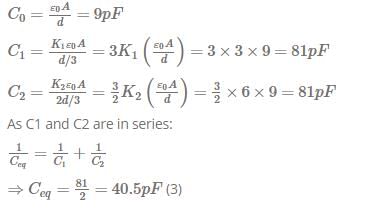JEE Main Practice Test- 22 - JEE MCQ
30 Questions MCQ Test - JEE Main Practice Test- 22
The frequency for which a 5 μF capacitor has a reactance of 1/1000 ohm is given by
If the instantaneous current in a circuit is given by: I = 2cos(ω t + φ)A, then r.m.s. value of the current is
When the speed of electrons increases, then the value of its specific charge
In which of the following systems will the radius of the first orbit (n = 1) be minimum
A ball weighing 10 g hits a hard surface vertically with a speed of 5 ms⁻1 and rebounds with the same speed. The ball remains in contact with the surface for 0.01 s. The average force exerted by the surface on the ball is
A dipole of dipole moment p̅ is placed in uniform electric field E̅, then torque acting on it is given by
In a certain 0.1m3 of space, electric potential is found to be 5V throughout. The electric field in this region is
A ball of mass 0.25 kg attached to the end of a string of length 1.96 m is moving in a horizontal circle. The string will break if the tension is more than 25 N. What is the maximum speed with which the ball can be moved?
A ball of mass m strikes elastically a wall at an angle of 30º with velocity ν. The change in momentum is
A current passing through a circular coil of two produces a magnetic field of 8 T at its centre. The coil is then rewound, so as to have four turns and current is passed through it is doubled. Now magnetic field at the centre of the coil will be
The following figure shows a logic gate circuit with two inputs A and B and the output C. The voltage waveforms of A, B and C are as shown below.
The logic circuit gate is
Sixty four spherical rain drops of equal size are falling vertically through air with a terminal velocity 1.5 m-s⁻1 If these drops coalesce to form a big spherical drop, then terminal velocity of big drop is
An aeroplane is flying horizontally with a velocity of 600 km/h and at a height of 1960 m. When it is vertically at a point A on the ground, a bomb is released from it. The bomb strikes the ground at point B. The distance AB is
In the following question, a Statement of Assertion (A) is given followed by a corresponding Reason (R) just below it. Read the Statements carefully and mark the correct answer-
Assertion(A): When charges are shared between two bodies, there occurs loss of energy.
Reason(R): In case of sharing of charges, conservation of energy fails.
In the following question, a Statement of Assertion (A) is given followed by a corresponding Reason (R) just below it. Read the Statements carefully and mark the correct answer-
Assertion(A): For refraction in a plane surface v can be used for the light moving from μ1 to μ2.
Reason(R): for light getting into a medium of index μ2 from μ1.
According to the Bohr model, electrons of quantum number n = 4 in excited hydrogen atoms can undergo transitions to lower energy states in different ways and give rise to photons of discrete frequencies. How many discrete frequencies are possible in this case?
A parallel plate capacitor with air between the plates has a capacitance of 9 pF. The separation between its plates is 'd' . The space between the plates is now filled with two dielectrics. One of the dielectrics has dielectric constant K1 = 3 and thickness d 3 while the other one has dielectric constant K2 = 6 and thickness. 2d 3 Capacitance of the capacitor is now
The angular speed of an engine wheel making 90 revolutions per minute is
An electron moves in a circular orbit with a uniform velocity v. It produces a magentic field B at the centre of the circle. The radius of the circle is proportional to
3 moles of ethanol react with one mole of phosphorus tribromide to form 3 moles of bromoethane and one mole of X. Which of the following is X?





















